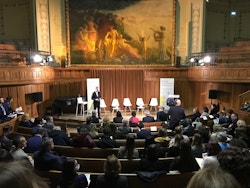Open Educational Resources (OER) toolkit
OER Benefits
Overview of benefits
OERs make the legal rights of resources clear so that individuals can better use resources, which helps meets local needs and also improves the quality of content, which benefits students by increasing learning outcomes and course completion rates (European Commission, 2018, 'Open Licenses in Open Education: why do they matter? Dr Cable Green (Part I)')
OERs benefit students
Benefits for students include:
- having access to a wider learning opportunities through high-quality materials that can present information in different formats and via different perspectives which can help students engage with the material and enrich learning
- gaining expanded access to learning since students (anywhere in the world) can access OERs at any time and as often as they like
- developing increased awareness of Una Europa JIFs, providing students with additional resources to help them decide whether a JIF, or engaging with further study more generally, is right for them
- engaging in active learning to create, co-create, or enhance OERs themselves that can benefit society
OERs benefit staff
Benefits for staff include:
- showcasing innovation and talent in teaching and research, sharing work with a wide audience learning about their expertise (including potential students, colleagues, and donors)
- enhancing course content since OERs are designed to be shared, adapted, and enhanced by incorporating edits that keep the content up-to-date and adapt it to be most relevant for different contexts
- creating courses more efficiently and/or effectively by using or adapting existing OERs, particularly multimedia resources (avoiding the recreation of existing materials, and enabling the customisation of existing resources to local contexts)
- learning about the ways in which others have taught the subject, to enhance coherence or explore different aspects of pedagogy and subject-based material
- advancing their reputation or professional profile by creating and sharing OERs publicly and joining open education communities of practice
" [Open education] ...aims to increase educational access and effectiveness, as well as equity, through fostering participation and knowledge co-creation, including by marginalised and traditionally under-represented groups. "
Open Education Policies: Guidelines for Co-Creation (p. 26), Open Education Policy Lab and the Open Education Policy Hub, 2019, CC BY-NC-4.0
OERs will help us achieve the Una Europa manifesto and aims
Creating, sharing, and actively using OERs advances many aspects of Una Europa’s manifesto, including (but not limited to):
- ‘not a place, but a body of knowledge, ideas, and values, evolving freely beyond borders, mediums and time’
- ‘created by and for society and as such driven to be of relevance, impact and high quality’
- ‘an open tradition, using the lessons of the past as a fertile ground to grow solutions for the future’
- ‘an intellectual playground, where critical minds can expand to their full aspiration’
The original 1Europe Project funding bid set out that a collection of OERs will bring together resources that represent Una Europa’s collective knowledge, ideas, and values while making them publicly available by sharing them at scale online. OERs also contribute to the 1Europe project’s aim of sharing and making international curricula and mobility more accessible, flexible, high-quality and cost-effective.
By advancing an open tradition, OERs will have licenses that clearly communicate how they can be shared with attribution to Una Europa. These licenses clarify how Una Europa will be attributed and whether OERs can be modified, remixed, and adapted to diverse contexts so as to be relevant to different communities while addressing changing future needs. In particular, the Una Europa 1Europe Project Work Packages 3 (Joint Innovative Formats in Education), 7 (CPD and Training of Staff), and 8 (Dissemination and Sustainability) include objectives relating to OERs, but many work packages can also benefit from incorporating OERs into their work.
Benefits for the Una Europa Alliance include:
- advancing the Una Europa manifesto and contributing to objectives in the development, dissemination and sustainability of Joint Educational Formats in education and mobility while contributing to enriching our shared knowledge commons
- raising the profile and reputation of Una Europa by increasing awareness of our high-quality work that expands the provision of learning opportunities as truly open and inclusive offerings
- lowering the cost of developing high-quality learning materials and being cost-effective when developing JIFs by using and adapting existing OERs to save resources, including staff time
- sharing work at scale since OERs are easy to distribute widely

Una Talk hosted at Université Paris 1 Panthéon Sorbonne, Tanya Lubicz-Nawrocka, University of Edinburgh, 2022, CC BY
OERs contribute to social justice
UNESCO recommends the creation and use of OERs since they advance the sustainable development goals:
‘UNESCO believes that universal access to information through high quality education contributes to peace, sustainable social and economic development, and intercultural dialogue. OER provide a strategic opportunity to improve the quality of learning and knowledge sharing as well as improve policy dialogue, knowledge-sharing and capacity-building globally’ (UNESCO).
OERs advance many Sustainable Development Goals (SDGs) including:
- quality education (SDG 4);
- gender equality (SDG 5);
- industry, innovation and infastructure (SDG 9);
- reduced inequalities (SDG 10);
- peace, justice and strong institutions (SDG 16); and
- partnerships for the goals (SDG 17).

University of Helsinki Botanical Garden Greenhouse, Tanya Lubicz-Nawrocka, University of Edinburgh, 2022, CC BY
Except where otherwise noted or where logos are trademarked, this content was developed by the Una Europa OER Working Group, 2022, CC BY.
